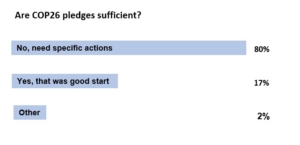What opportunities do the COP26 outcomes bring to the coal-reliant countries?
07/12/2021

The 26th Conference of Parties (COP) was deemed as our chance to save our planet from drastic climate change. Each one of us working in the area related to the decarbonisation of our economy placed high hopes on the delegates to put together an ambitious yet realistic plan to limit global warming to 1.5°C – in line with the Paris Agreement ambitions.
Although I couldn’t attend COP26 in person on this occasion, I’ve decided to discuss the COP26 progress and outcomes with my LinkedIn network. Reflecting on the discussions I’ve had over the past couple of weeks, I remain hopeful about our ability to reduce global greenhouse gas emissions.
Our global activities have led to 1.1°C warming to date. Such a degree of global warming has already impacted many areas worldwide, causing flooding and extreme heat waves to name a few. Our reliance on coal and gas to meet our energy needs has been responsible for most of our greenhouse gas emissions over the past decades. No wonder that the discussion about phasing out coal triggered so many reactions.
Where did COP26 land on coal? Well, it’s been a true roller coaster. Many of us (me included) hoped to see plans for global coal phase-out by 2030. After all, coal combustion results in 14.8 gigatonnes of CO2 being pumped into our atmosphere every year – about 45% of our global energy-related CO2 emissions in 2020, according to the IEA. It is, therefore, imperative that we shift away from unabated coal to low-carbon alternatives. That is why I welcomed the initial commitments from 40 countries to shift away from coal by 2030-2040.
The first draft of the Glasgow Climate Pact clearly “called upon Parties to accelerate the phasing-out of coal and subsidies for fossil fuels“. However, the final text calls for “phase-down of unabated coal power and inefficient fossil fuel subsidies“. Many of you agreed that such COP26 pledges are insufficient.

I think the COP26 outcomes and pledges could have been more ambitious and could have provided a more specific pathway to achieving global net-zero. But leaving my net-zero hat aside, I get why some countries pushed to tune down the commitment to phase out coal use. Coming from a coal-reliant country myself, I know it isn’t easy to revamp the entire energy system over a decade. It’s especially the case when coal is used for domestic heating. If we consider the limited access to electricity, grid reliability issues and limited R&D budgets, it’s obvious why some countries want to keep using fossil fuels for as long as possible. After all, coal is still one of the least expensive ways to produce energy and the foundation for economic growth in many cases. Yet, I do believe that the coal-reliant economies have an opportunity in front of themselves that their short-term thinking should not hinder.
Having discussed these issues with my network during COP26, I can conclude that low-carbon technologies are still perceived as more expensive than conventional fossil fuel options. However, according to the IEA’s World Energy Outlook, the cost of renewable energy is now comparable, if not cheaper, than that of fossil energy. Furthermore, significant cost reductions were also achieved in the recent demonstration projects for carbon capture and hydrogen production that can be used for industrial decarbonisation and direct air capture.
Regardless of whether we can consider the COP26 outcomes as a success or not, we do have to ask ourselves a simple question: is it worth investing in cheap technologies of yesterday and having to retrofit/retire them in a couple of years at extra cost, or is it more cost-effective to deploy low-carbon technologies now to mitigate the social costs of climate change?
What is my view? Considering the holistic cost of climate change, I believe the coal-reliant countries will be better off by investing in low-carbon technologies, such as carbon capture, hydrogen and renewables, as soon as possible. Although the cost of some of these technologies is still higher than that of the corresponding fossil fuel alternatives, the increased pressure on reducing greenhouse gas emissions will significantly increase the cost of the unabated use of fossil fuels over the next decade. We can already see this happening in the EU, where the price of CO2 emission allowance has increased to over €70/tCO2. Consequently, the low-carbon technologies will yield better returns in the mid to long term. These will also result in the reduced social cost of climate mitigation.
Overall, I remain hopeful about our ability to limit global warming. The COP26 outcomes and our current socio-political situation showed us that it won’t be easy. But through education and engagement, we can enable rapid commercialisation of low-carbon technologies and raise awareness of the activities we all can take to contribute to becoming a net-zero society. After all, a global problem needs a global contribution.
Categories & Tags:
Leave a comment on this post:
You might also like…
Introducing… Bloomberg Trade Flows
Are you interested in world trade flows? Would it be useful to know which nations are your country's major trading partners? If so, the Bloomberg terminal has a rather nifty function where you can view ...
Cranfield alumni voyage to the International Space Station
Seeing our alumni reach the International Space Station (ISS) has a ripple effect that extends far beyond the space sector. For school students questioning whether science is “for them”, for undergraduates weighing their next ...
From classroom to cockpit: What’s next after Cranfield
The Air Transport Management MSc isn’t just about learning theory — it’s about preparing for a career in the aviation industry. Adit shares his dream job, insights from classmates, and advice for prospective students. ...
Setting up a shared group folder in a reference manager
Many of our students are now busy working on their group projects. One easy way to share references amongst a group is to set up group folders in a reference manager like Mendeley or Zotero. ...
Company codes – CUSIP, SEDOL, ISIN…. What do they mean and how can you use them in our Library resources?
As you use our many finance resources, you will probably notice unique company identifiers which may be codes or symbols. It is worth spending some time getting to know what these are and which resources ...
Supporting careers in defence through specialist education
As a materials engineer by background, I have always been drawn to fields where technical expertise directly shapes real‑world outcomes. Few sectors exemplify this better than defence. Engineering careers in defence sit at the ...






